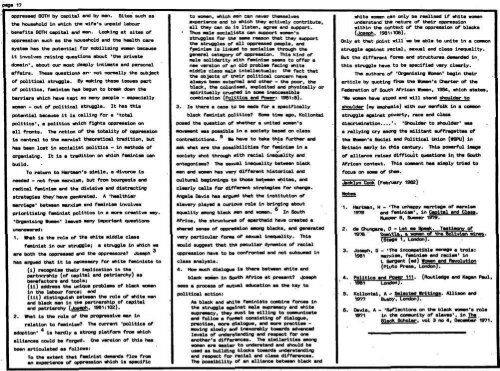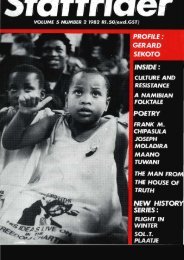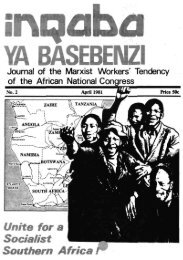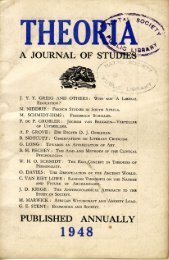You also want an ePaper? Increase the reach of your titles
YUMPU automatically turns print PDFs into web optimized ePapers that Google loves.
pega 17<br />
oppressed BOTH by capital and by een. Sites such a*<br />
tha household in ehieh tM elfe's unpaid labour<br />
benefits BOTH capital and mm. Looking at altaa of<br />
oppression such as th« household and tha health car*<br />
system hes tha potential far mobilising women because<br />
it involves raising questions about 'the private<br />
domain', about our most dooply intieete and paraonal<br />
affairs. These question* en* not noneelly tha subject<br />
of political struggle. ^ Making these laauaa part<br />
of politics, feminism he* bagun to break doan tha<br />
barriara ahlch hava kept 00 aany paopla - especially<br />
eoeen - out of political struggle. It haa thla<br />
potantUl bacauaa it la calling for a 'total<br />
politics*, a polltlca atilch flghta oppression on<br />
all fronta- Tha notion of tha totality of oppression<br />
la cantrml to tha amdit theoretical tradition, but<br />
haa baan lost In racialist politics - In methods of<br />
organising. It la a tradition on ehicn feminism can<br />
build.<br />
To raturn to HartsaVt'e alalia, a divorce la<br />
needed - not fro* marxism, but froa bourgaola and<br />
radical faainlsai and tha divlaiva and dlatractlng<br />
atrataglaa they* hava generated. A 'healthier<br />
aerrlage* bataaan amrxle* and feminism lnvolvaa<br />
prioritising foadnist polltlca in a aora craatlva eey.<br />
•Organising eYjaen* leave* "any Important quaaUona<br />
unaneeereds<br />
1. *hat la tha rola of tha ahita middle claaa<br />
faminiat In our atruggla; a struggle In ahlch aa<br />
ara both tha oppraaaad and tha oppressors? Joaaph<br />
haa arguad that it la necaasary for ahita feminists to<br />
(l) racognlaa thair implication In tha<br />
partnership (of capital and patriarchy) aa<br />
banafactors and tools;<br />
(ii) address tha unique problaaa of black eoeen<br />
In tha labour force*; and<br />
(ill) distinguish bataaan tha rola of ahita een<br />
and black nan in tha partnership of capital<br />
and patriarchy (Joaaph, 1901:102).<br />
2. Ihat Is tha rale of tha progressiva een In<br />
relation to feeinlee? The currant 'politic** of<br />
adoption' 4 la hardly a strong platform froa ahlch<br />
alliances could be forge*. One version of this hea<br />
boen articulated aa follows:<br />
To tha eittent that feminist daaanda flow froa<br />
m^ experience of oppression ahlch is specific<br />
to eoasn, which een can never themselves<br />
emparlance and to ahich they actively contribute,<br />
all they can do *e listen, agree and support*<br />
Thus male socialists can support women's<br />
struggles for tM see* raaaon that they support<br />
the struggles of ell oppressed people, and<br />
faalnlaa is linked to socialise, through the<br />
general cetegory of oppression. This kind of<br />
aele solidarity elth faalnlaa aeeas to offer e<br />
nee version of an old problem facing ahita<br />
middle dees aala lntellactuela: the fact that<br />
tha objects of tnelr polltlcel concern have<br />
alaays been external and other - the poor, the<br />
black, the colonieed, exploited and physically or<br />
spiritually crushed in soae Inaccessible<br />
combination (Politics and Poeer: 1991:3).<br />
3. la there a case U> be aada for a speclficolly<br />
black faainlat politics? Soma time ago, Kollontai<br />
posed the question of ehether a united eoeen's<br />
aovaaent aas possible in a aoclety based on class<br />
contradict lone* ee harve to take thle further and<br />
aak ehat are the possibilities for faalnlaa in a<br />
v<br />
society shot through elth racial Inequality and<br />
antagonises? The eexual inequality beteeen black<br />
een and somen haa very different historical and<br />
cultural beginnings tP those beteeen ehltes, and<br />
clearly calls for dlffsrent atrategiee for change.<br />
Angela Oavls has ergued that tha inetltutlon of<br />
elavery pleyed a curloua role in bringing about<br />
equality aaong black een end eoeen. In South<br />
Africa, the structure* of apartheid hava created a<br />
shared senae of oppression aaong blacks, and generated<br />
ymrf particular foree of sexual inequality. Thla<br />
eould auggest that tha peculiar dynamics of racial<br />
oppression have to be confronted and not subsuaad in<br />
claas anelyele.<br />
4. Hoe much dialogue 1* there beteeen ahita and<br />
black soman in South Africa at preeent? joaaph<br />
seea a prooase of mutual •creation aa the key to<br />
political action:<br />
Aa black and shite feminists combine forcts In<br />
the atruggla against eele aupraascy and ahita<br />
supremacy, they rust be willing to communicate<br />
and follow a ror-et consisting of dialogue,<br />
practise, more dialogue, and acre practise -<br />
moving slowly and Inexorably toaerds advanced<br />
levela of underetandlng and reepect for one<br />
another's dlfferencee. The similarities among<br />
eoeen era aaalar to understand and ahould be<br />
used es building blocks toearde understanding<br />
and respect for racial and claaa dlfferencee.<br />
The possibility of an alliance beteeen black and<br />
ahita women c*n only bs realised If enite eoeen<br />
understend the nature of their oppression<br />
eithin the context of the oppression of blacks<br />
[Joaaph, 1961:106).<br />
Only at that point "ill »• be able to unite in a Lueauii<br />
struggle agelnet reclel, saxuel end claas inequality.<br />
But tha different forme and structures demanded in<br />
thla struggle have to be specified very clearly.<br />
Tha authors of 'Organising Women* begin their<br />
article by quoting froa the Women's Charter of the<br />
Federation of South African Women, l9S4t ahlch etatee,<br />
'we eoeen have stood and will stand shoulder to<br />
shoulder (ay aaphesl*) *ith our menfolk In e coaaon<br />
struggle egalnst poverty, race and claaa<br />
dlscrtadnatiom,*.*. 'finouloer to shoulder' mas<br />
a rallying cry among the militant auffragettae of<br />
the •o-en's Social and Political Union (ISPU) In<br />
Britain early In this century, thla powerful leaps<br />
of alliance raise* difficult questions ln the South<br />
African context. Thla ooaaent hee simply triad to<br />
focus on aoae of thee.<br />
Jacklyn Cock (February 196?)<br />
•sas<br />
'1. Hertaan, H - 'The unhappy aarrlaga of marxism<br />
1979 and feeinlam*, ln Capital and Class.<br />
Number 6, ttuaeor 1999.<br />
2. da Chungare, 0 - Let mm Speak. Testimony of<br />
1976 ' DreiitlaTT^oaan of t*e Bolivian elnos,<br />
(Qtage 1, London).<br />
3. Joaaph, 0 - 'The incompatible eenege a trois:<br />
1961 aanciaSJ, faalnlaa and reciea 1 In<br />
L Sargent (ed) WOaen and Revolution<br />
[Pluto Prase, London J.<br />
4. Politics and Pcmrny 111. (Routladge and Kegan Paul,<br />
5. Kollontai, A - Selected Tritings. Allison and<br />
1977 Bueoyt LondonJ.<br />
6. Oevie, A * •Refleetiona on the black eoeen *s role<br />
1971 in Che coeemjnlty of sieves 4 , ln The t<br />
Blacx Scholar, vol 3 no 4, December 1971.

















